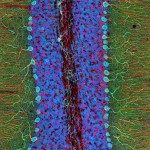Link to Pubmed [PMID] – 12768031
J. Virol. 2003 Jun;77(12):7113-9
Two members of the signal transducer and activator of transcription family, STAT1 and STAT2, form, together with interferon regulatory factor 9 (IRF-9), the ISGF3 complex that activates the expression of the interferon-stimulated genes (ISG). The ISGF3 complex also participates in the virus-induced alpha/beta interferon (IFN-alpha/beta) gene amplification cascade by up-regulating IRF-7 gene expression. Here, we show that treatment of cells with trichostatin A (TSA), a deacetylase inhibitor, inhibits the virus-induced activation of IFN-alpha/beta promoters and dramatically reduces the ability of different ISG promoters to respond to IFN stimulation. Impairment of IFN-alpha/beta and ISG expression by TSA in infected cells is due to the blockage of interferon-stimulated ISGF3 complex formation, which leads to the abolition of IRF-7 gene expression. We also show that the TSA-dependent inhibition of ISGF3 is related to impaired nuclear accumulation of STAT2. Our data suggest that an acetylation/deacetylation mechanism participates in the regulation of cellular distribution and function of STAT2 in IFN-alpha/beta signaling.

